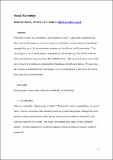Social mereology
Abstract
What kind of entity is a committee, a book group, or a band? I argue that committees and other such social groups are concrete, composite particulars, having ordinary human beings among their parts. Thus, the committee members are literally parts of the committee. This mereological view of social groups was popular several decades ago but fell out of favor following influential objections from David-Hillel Ruben. Recent years have seen a tidal wave of work in metaphysics, including the metaphysics of parts and wholes. We now have the resources to rehabilitate the mereological view of social groups. I show how this can be done and why we should bother.
Citation
Hawley , K 2018 , ' Social mereology ' , Journal of the American Philosophical Association , vol. 3 , no. 4 , pp. 395-411 . https://doi.org/10.1017/apa.2017.33
Publication
Journal of the American Philosophical Association
Status
Peer reviewed
ISSN
2053-4477Type
Journal article
Description
Work on this paper was supported by a Leverhulme Major Research Fellowship.Collections
Items in the St Andrews Research Repository are protected by copyright, with all rights reserved, unless otherwise indicated.

